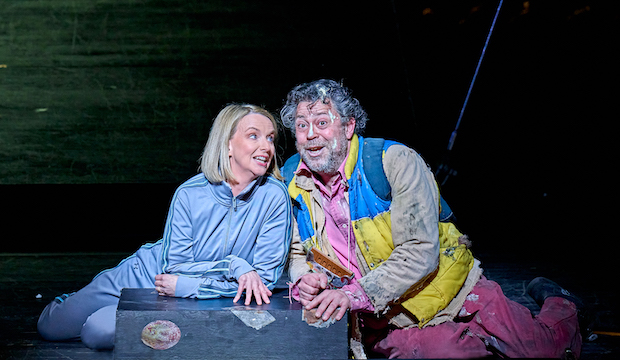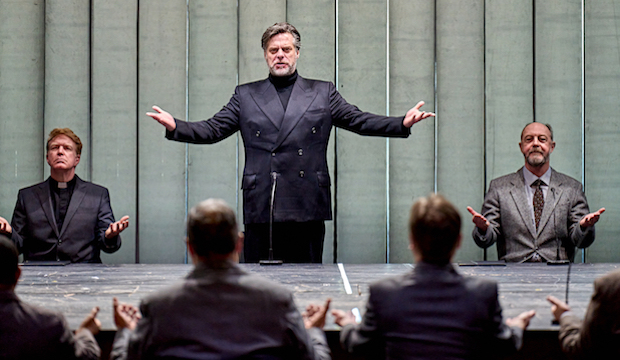The Magic Flute, English National Opera review ★★★★★
Inventiveness and enchantment meet unadulterated joy in Simon McBurney's uplifting production
Prince Tamino (Norman Reinhardt) receives the magic flute. Photo: Manuel Harlan
Fed up with the state of the nation, the ghastly weather and the poor, weary world? Then head to the London Coliseum and immerse yourself in the myriad delights of Mozart’s The Magic Flute. You are bound to emerge with a big smile on your face and a spring in your step.
English National Opera, beset by financial woes, redundancies and a hostile political climate, somehow manages to rise above it all to produce an evening of enchantment; a heady alchemy of comedy, solemnity and sheer, unadulterated joy.
When director Simon McBurney’s name is on the tin, you know you are going to find a whole lot of goodies inside, and his 2017 production, revived by Rachael Hewer, is again packed with tasty treats. With his theatre company Complicité he invites us to step into a pantomime world of make-believe, where sheets of paper become flocks of birds, bottles double as musical instruments, young boys become old men and a bashed-up stepladder is a vital prop.
And there are no false walls in his shows: members of the orchestra, raised up out of the pit to stage level, are as much a part of the action as the splendid chorus. Not even the audience escapes, as characters rush to and fro through the auditorium and sometimes even push their way through the seating.
That stepladder belongs to the birdcatcher Papageno, sung by the engaging David Stout, who combines a fine baritone with masterly comic timing. He has been charged to accompany a prince on a mission to save a princess, daughter of the Queen of the Night. Off he goes, reluctant and fearful, carrying his stepladder into a temple of wisdom, where his prince, Tamino, vows to undergo trials to attain not only enlightenment but also the hand of the princess, Pamina.

Pamina (Sarah Tynan) and Papageno (David Stout), sing of the joys of finding love. Photo: Manuel Harlan
Too often, productions of Magic Flute are dragged down by too much dialogue, but here Stephen Jeffreys’s admirably fleet and witty translation cuts through the verbiage and keeps the action moving.
Two American singers make their ENO debuts: soprano Rainelle Krause is a spectacular Queen of the Night, her ringing coloratura winning shouts of praise from the audience, but tenor Norman Reinhardt fares less well. He is said to have made Tamino something of a signature role, but on opening night he seemed ill-at-ease and vocally clouded, not helped by some very brisk tempi from conductor Erina Yashima, also making her ENO debut. It’s important to keep things brisk, but her hard-driving baton meant some of Mozart’s more sublime gestures sailed past too quickly.
The profound depth of Canadian John Relyea’s wondrous bass makes him the perfect Sarastro, high priest of the temple, but even his stately arias were not allowed to linger. (Never mind, he returns to ENO next month in Bartók’s Duke Bluebeard’s Castle; after his spellbinding performance of the piece with the London Philharmonic in 2021 it promises to be unmissable.) Sarastro is ably assisted by
another mellifluous bass, Jonathan Lemalu, as the Speaker, and by two fine Armed Men, tenor Gavin Ring and baritone Ossian Huskinson.

Sarastro (John Relyea) consults his council of followers. Photo: Manuel Harlan
Central to the drama is sweet Pamina, struggling to understand the opposing motives of her mother and Sarastro, and her sudden love for Tamino. She is sung with pure-hearted grace and crystaline beauty by soprano Sarah Tynan. It’s a lovely performance. And what of Papageno? Can he find love, too? Well, in true pantomime tradition of course he does. The skittish, birdlike Papagena is a perfect role for the irrepressible soprano Alexandra Oomens.
The magic flute of the title is bestowed on Tamino to help him through his trials, but in McBurney’s production he does not even pretend to play it. That falls to principal flautist Claire Wickes, who steps out of the orchestra to play, radiantly. Similarly, Papageno surrenders his magic bells to celeste player Murray Hipkin, until he turns the tables. I won’t spoil that twist, nor will I tell you about the hilarious insertion of a certain theme by Beethoven, a perfect gesture of contempt for the mess Brexit has made of this country – and to the lives of its hard-pressed musicians.
The Magic Flute is sung in English with English surtitles. Further performances are on 1, 6, 9, 12, 15, 19, 26, 28 March
English National Opera, beset by financial woes, redundancies and a hostile political climate, somehow manages to rise above it all to produce an evening of enchantment; a heady alchemy of comedy, solemnity and sheer, unadulterated joy.
When director Simon McBurney’s name is on the tin, you know you are going to find a whole lot of goodies inside, and his 2017 production, revived by Rachael Hewer, is again packed with tasty treats. With his theatre company Complicité he invites us to step into a pantomime world of make-believe, where sheets of paper become flocks of birds, bottles double as musical instruments, young boys become old men and a bashed-up stepladder is a vital prop.
And there are no false walls in his shows: members of the orchestra, raised up out of the pit to stage level, are as much a part of the action as the splendid chorus. Not even the audience escapes, as characters rush to and fro through the auditorium and sometimes even push their way through the seating.
That stepladder belongs to the birdcatcher Papageno, sung by the engaging David Stout, who combines a fine baritone with masterly comic timing. He has been charged to accompany a prince on a mission to save a princess, daughter of the Queen of the Night. Off he goes, reluctant and fearful, carrying his stepladder into a temple of wisdom, where his prince, Tamino, vows to undergo trials to attain not only enlightenment but also the hand of the princess, Pamina.

Pamina (Sarah Tynan) and Papageno (David Stout), sing of the joys of finding love. Photo: Manuel Harlan
Too often, productions of Magic Flute are dragged down by too much dialogue, but here Stephen Jeffreys’s admirably fleet and witty translation cuts through the verbiage and keeps the action moving.
Two American singers make their ENO debuts: soprano Rainelle Krause is a spectacular Queen of the Night, her ringing coloratura winning shouts of praise from the audience, but tenor Norman Reinhardt fares less well. He is said to have made Tamino something of a signature role, but on opening night he seemed ill-at-ease and vocally clouded, not helped by some very brisk tempi from conductor Erina Yashima, also making her ENO debut. It’s important to keep things brisk, but her hard-driving baton meant some of Mozart’s more sublime gestures sailed past too quickly.
The profound depth of Canadian John Relyea’s wondrous bass makes him the perfect Sarastro, high priest of the temple, but even his stately arias were not allowed to linger. (Never mind, he returns to ENO next month in Bartók’s Duke Bluebeard’s Castle; after his spellbinding performance of the piece with the London Philharmonic in 2021 it promises to be unmissable.) Sarastro is ably assisted by
another mellifluous bass, Jonathan Lemalu, as the Speaker, and by two fine Armed Men, tenor Gavin Ring and baritone Ossian Huskinson.

Sarastro (John Relyea) consults his council of followers. Photo: Manuel Harlan
Central to the drama is sweet Pamina, struggling to understand the opposing motives of her mother and Sarastro, and her sudden love for Tamino. She is sung with pure-hearted grace and crystaline beauty by soprano Sarah Tynan. It’s a lovely performance. And what of Papageno? Can he find love, too? Well, in true pantomime tradition of course he does. The skittish, birdlike Papagena is a perfect role for the irrepressible soprano Alexandra Oomens.
The magic flute of the title is bestowed on Tamino to help him through his trials, but in McBurney’s production he does not even pretend to play it. That falls to principal flautist Claire Wickes, who steps out of the orchestra to play, radiantly. Similarly, Papageno surrenders his magic bells to celeste player Murray Hipkin, until he turns the tables. I won’t spoil that twist, nor will I tell you about the hilarious insertion of a certain theme by Beethoven, a perfect gesture of contempt for the mess Brexit has made of this country – and to the lives of its hard-pressed musicians.
The Magic Flute is sung in English with English surtitles. Further performances are on 1, 6, 9, 12, 15, 19, 26, 28 March
TRY CULTURE WHISPER
Receive free tickets & insider tips to unlock the best of London — direct to your inbox
| What | The Magic Flute, English National Opera review |
| Where | London Coliseum, St Martin's Lane, , London , WC2N 4ES | MAP |
| Nearest tube | Embankment (underground) |
| When |
28 Feb 24 – 28 Mar 24, 11 performances, including relaxed and matinees. Running time 2hr 55min, including one interval |
| Price | £0-£160 |
| Website | Click here for more information and booking |